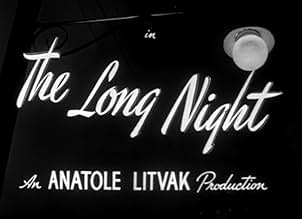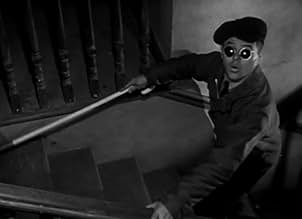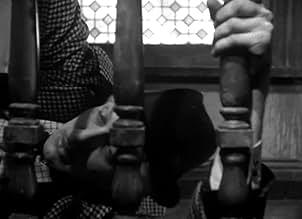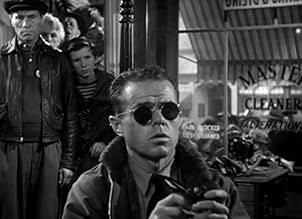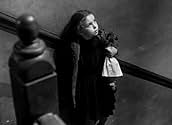AVALIAÇÃO DA IMDb
6,5/10
2,3 mil
SUA AVALIAÇÃO
Adicionar um enredo no seu idiomaPolice surround the apartment of apparent murderer Joe Adams, who refuses to surrender although escape appears impossible. During the siege, Joe reflects on the circumstances that led him to... Ler tudoPolice surround the apartment of apparent murderer Joe Adams, who refuses to surrender although escape appears impossible. During the siege, Joe reflects on the circumstances that led him to this situation.Police surround the apartment of apparent murderer Joe Adams, who refuses to surrender although escape appears impossible. During the siege, Joe reflects on the circumstances that led him to this situation.
- Direção
- Roteiristas
- Artistas
- Prêmios
- 4 vitórias no total
Melinda Byron
- Peggy
- (as Patty King)
Davis Roberts
- Freddie
- (as Robert A. Davis)
Fred Aldrich
- Ticket Taker
- (não creditado)
Murray Alper
- Mac - Bartender
- (não creditado)
Bobby Barber
- Nightclub Patron
- (não creditado)
Vangie Beilby
- Audience Member
- (não creditado)
Brooks Benedict
- Audience Member
- (não creditado)
Gladys Blake
- Millie - Saloon Waitress
- (não creditado)
- Direção
- Roteiristas
- Elenco e equipe completos
- Produção, bilheteria e muito mais no IMDbPro
Avaliações em destaque
I just have to say... It seems as though every negative comment about this film starts out with "this is a bad REMAKE of..." Surely, I suppose it's nearly impossible to view THE LONG NIGHT as itself when you have already seen Marcel Carne's 1939 flick (and maybe even harder if you have created within yourself a dedication to anything foreign, slightly obscure, or non-Hollywood). The great thing about this movie, if one can get over the remake aspect of it, is that it is truly LOADED with great things! The set design and artwork are fantastic! Tiomkin's music is, once again, a fine creation! Polito's cinematography, camera work, and use of light are brilliant! Sure, the great story is, for the most part, taken from somewhere else, but the screenplay by the great John Wexley is excellent. I might be reading a bit to much into this, but I saw working class heroism, touches of popular justice, and just a hint of bourgeois deceit. The latter showed in the fantastic performance by Vincent Price as his character continued to try to sell a fantasy to Jo Ann (Barbara Bel Geddes) by means of magic and falsehood. All in all, I think this one is just like any good work of art: if you put a little into it, you can get a lot out of it.
I've never seen the original French film upon which this film was based, but I can tell you I kept waiting for a plot line payoff that never came. It has everything going for it - solid cast giving good believable performances, good direction, even a good speech that Fonda's character delivers from this broken out window as he is under siege by the police that gives us some insight into what it's like for an average guy who has returned home from years of killing and seeing killing in the war expected to pick up where he left off. But ultimately, I never see anything that Fonda's character, factory laborer Joe Adams, has been put through as far as shock or emotional torment or even disillusionment that would justifiably cause him to kill a man. Is Vincent Price's character Maximillian eloquently taunting and creepy? Yes, and in a way that Price excelled at over the years starting in noirs and proceeding on into his horror films. However, at no time does he do anything that would drive anybody to do more than shoo him away or stuff earplugs in their ears or possibly call the ASPCA (You'll have to watch the film to understand this last remark). I'm giving this film a five just for the fact that I believe the production code is the reason any hard edges that seem to be just under the surface never appear. I'm almost positive the script would have gone further if the censors would have allowed it to be so.
The real point of interest to me was the action of the police, who behave a lot like the fascists that Joe Adams spent years fighting in WWII. Sure they have a murderer holed up in his rented room, but he's holding no hostages, they've emptied the building, and still they spray him twice with automatic gunfire unannounced - once from the outside into his window, then from the stairwell into the door. When he pushes a sturdy dresser against the door and they realize they can't force their way in THEN they try talking to Joe, starting with the line "We're not fooling"?? No kidding! After Fonda's speech to the crowd, once the crowd starts voicing their support for Joe and promising financial help with a lawyer the police form a line and practically trample the crowd forcing them out of the street. I don't know if the heavy handedness of the police was something that Litvak wanted the audience to notice, but it was something I noticed.
I'd recommend this one just for the good performances and atmosphere and some imagery you don't see that much in films immediately after WWII, but don't expect something shocking or even interesting to happen just because of all of the talent assembled here.
The real point of interest to me was the action of the police, who behave a lot like the fascists that Joe Adams spent years fighting in WWII. Sure they have a murderer holed up in his rented room, but he's holding no hostages, they've emptied the building, and still they spray him twice with automatic gunfire unannounced - once from the outside into his window, then from the stairwell into the door. When he pushes a sturdy dresser against the door and they realize they can't force their way in THEN they try talking to Joe, starting with the line "We're not fooling"?? No kidding! After Fonda's speech to the crowd, once the crowd starts voicing their support for Joe and promising financial help with a lawyer the police form a line and practically trample the crowd forcing them out of the street. I don't know if the heavy handedness of the police was something that Litvak wanted the audience to notice, but it was something I noticed.
I'd recommend this one just for the good performances and atmosphere and some imagery you don't see that much in films immediately after WWII, but don't expect something shocking or even interesting to happen just because of all of the talent assembled here.
This is an example of a very BAD remake.Proof positive that great actors and good directors do not necessarily mean good work.You have got to bear in mind that Carné/Prévert's "Le JOur se Lève" was made in 1939 at a time when France was not smiling .The movie was so depressing it was quickly forbidden by the military censorship (see my review of the French film for more details).The movie was an exact reflection of its time.Out of that context it's another melodrama.Besides,deprived
of Prévert's lines -when a poetic dialog is translated into another language,there's always a problem- it loses much of its appeal)
Although one of the best actors in American cinema,Henry Fonda could not succeed in Gabin's plebeian part.Ann Dvorak is the most adequate choice since her swagger imitates Arletty's.
And who could forgive the new ending?
of Prévert's lines -when a poetic dialog is translated into another language,there's always a problem- it loses much of its appeal)
Although one of the best actors in American cinema,Henry Fonda could not succeed in Gabin's plebeian part.Ann Dvorak is the most adequate choice since her swagger imitates Arletty's.
And who could forgive the new ending?
I wouldn't say The Long Night is a great film, and if anything it only peaks my interest more to see how much more classic the film it's based on is- Marcel Carne's La Jour se Leve. But for the time it ran, I was mostly glued to the screen, and got wrapped up in the plight of Henry Fonda's character Joe, and his predicament of his downfall from normalcy. It probably isn't very original, taking aside its connection with the French source; it's about a factory worker, very nice guy, who falls in love with a woman whom, he finds out, was an orphan just like him. But one night he follows her to a bar, sees her cavorting sort of with a sleazy magician (Vincent Price), and his perfect image of her is shattered, and grows only darker after he meets him (he first tells Joe he's her father, which is a truly great scene between two huge stars of classic film), and when she tells him about her history with him.
While I could never take my eyes off the screen, it should be said that for all of the strong craftsmanship with the picture (it's one of the finest photographed 'noirs' of the late 40s, especially for those stark scenes of Joe alone in his room with the whole town on the street calling for him) and for all of the tremendous talent in front of the camera- besides Fonda and Price, who the former it's a splendid and rewarding if not best-ever performance and for the latter a triumph of playing sneaky and villainous, the girl playing Jo Ann (Barbara Bel Geddes) is very good- it only works up to a point. I was engrossed the most in the last twenty minutes or so, as the film revved up its pace and tempo to the "will Joe or won't Joe" beat. Before that, it's many scenes that mostly rely on the presence of the actors to uplift the material past the breezy and conventional air of the dialog. There's nothing especially "wrong" with the material, but it doesn't go anywhere aside from hitting its main points.
The Long Night is something of a minor lost marvel- only recently did it come out on DVD in an OK print- and for Fonda and Price fans its a can't-miss kind of picture. Just don't go expecting anything that will change your perception of what film-noirs can go that don't go for the easy routes.
While I could never take my eyes off the screen, it should be said that for all of the strong craftsmanship with the picture (it's one of the finest photographed 'noirs' of the late 40s, especially for those stark scenes of Joe alone in his room with the whole town on the street calling for him) and for all of the tremendous talent in front of the camera- besides Fonda and Price, who the former it's a splendid and rewarding if not best-ever performance and for the latter a triumph of playing sneaky and villainous, the girl playing Jo Ann (Barbara Bel Geddes) is very good- it only works up to a point. I was engrossed the most in the last twenty minutes or so, as the film revved up its pace and tempo to the "will Joe or won't Joe" beat. Before that, it's many scenes that mostly rely on the presence of the actors to uplift the material past the breezy and conventional air of the dialog. There's nothing especially "wrong" with the material, but it doesn't go anywhere aside from hitting its main points.
The Long Night is something of a minor lost marvel- only recently did it come out on DVD in an OK print- and for Fonda and Price fans its a can't-miss kind of picture. Just don't go expecting anything that will change your perception of what film-noirs can go that don't go for the easy routes.
Holed up in his apartment after committing a murder, a depressed war veteran engages in a gun battle with the police while reflecting on the circumstances that led to the situation. It sounds intriguing on paper, but the script is rather sloppy, featuring flashbacks within flashbacks. It's basically an uninteresting story with dull characters. Fonda tries to make something of his role, but is given little to work with. Bel Geddes makes an impressive film debut, and Dvorak and Price are also fine, but they are all let down by the screenplay. Litvak has made better films, but here his staging of police work and the shootout is poorly executed.
Você sabia?
- CuriosidadesFilm debut of Barbara Bel Geddes. She was signed to a seven-year contract with RKO after this film. Director Anatole Litvak cast her after seeing her on Broadway as the female lead in "Deep Are the Roots", which played at the Fulton Theatre for 477 performances beginning 26 September 1945.
- Erros de gravaçãoWhen Joe from inside his apartment shoots at the cops who are standing outside his door; it leaves bullet holes in the door. But on a following cut after speaking with the little girl and going back into his apartment; there are no bullet holes on the interior side of the door.
- Citações
Maximilian: [to Jo-Ann] You have sharp nails like a little animal. Maybe that's what I like about you.
- Cenas durante ou pós-créditosOpening card: "...the night is long That never finds the day..." William Shakespeare, Macbeth, Act IV, Scene III
- ConexõesFeatured in Henry Fonda: The Man and His Movies (1982)
Principais escolhas
Faça login para avaliar e ver a lista de recomendações personalizadas
- How long is The Long Night?Fornecido pela Alexa
Detalhes
Bilheteria
- Faturamento bruto nos EUA e Canadá
- US$ 1.000.000
- Tempo de duração1 hora 41 minutos
- Cor
- Proporção
- 1.37 : 1
Contribua para esta página
Sugerir uma alteração ou adicionar conteúdo ausente

Principal brecha
By what name was Noite Eterna (1947) officially released in India in English?
Responda

